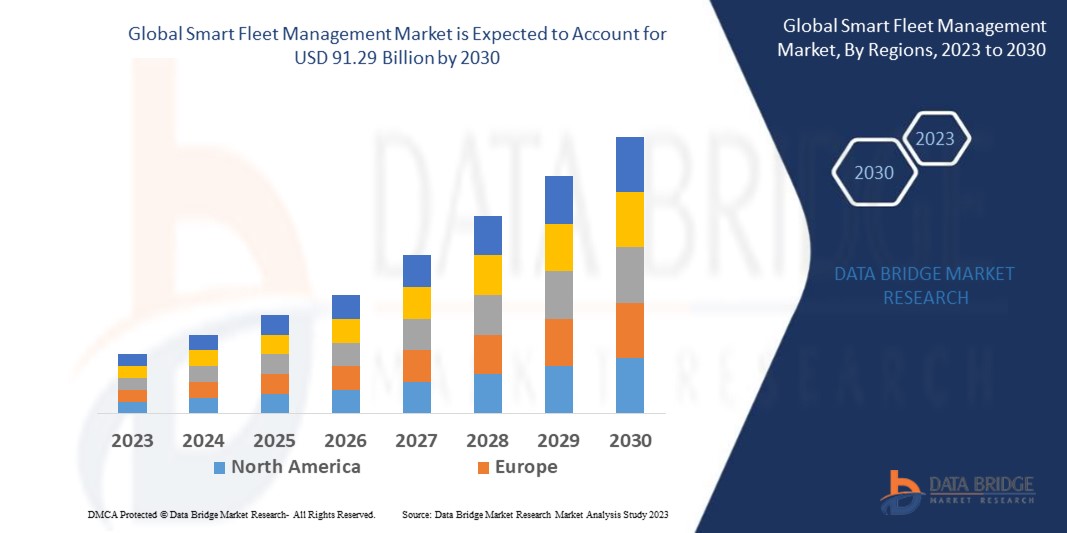The Smart Fleet Management Market is rapidly evolving as businesses worldwide transition from conventional fleet operations to digitally enabled, intelligent, and automated fleet ecosystems. Leveraging technologies such as IoT, AI, telematics, cloud computing, predictive analytics, and autonomous systems, smart fleet management aims to improve fleet efficiency, reduce operational costs, enhance driver safety, and ensure real-time visibility across logistics networks.
As global transportation, logistics, automotive, and mobility industries expand, the demand for real-time fleet monitoring and smart operational tools continues to surge. The ongoing growth of e-commerce, increased global trade, and the integration of digital solutions across mobility infrastructure are further accelerating the adoption of smart fleet management systems.
According to industry insights, the market is expected to witness strong annual growth over the next decade, driven by widespread digitization, rising fuel costs, environmental sustainability goals, and the need for improved fleet utilization.
Key Market Drivers
1. Rising Demand for Real-Time Fleet Monitoring
Companies are increasingly investing in telematics and connected vehicle solutions to monitor vehicle conditions, driver behavior, speed, fuel consumption, and routing in real time. These insights help fleet managers optimize routes, reduce downtime, and improve operational accuracy.
2. Growth of E-Commerce and Logistics
The global expansion of e-commerce platforms has significantly accelerated the need for efficient last-mile delivery and fleet optimization. As companies require scalable and fast logistics operations, smart fleet management solutions become a necessity to maintain service quality and delivery speed.
3. Technological Advancements in IoT & Telematics
The integration of IoT sensors, satellite tracking, geofencing, and AI-powered analytics provides predictive insights that improve vehicle maintenance and fleet performance. This technological advancement is a major catalyst behind market growth.
4. Government Regulations for Vehicle Safety & Emissions
Countries worldwide have introduced regulatory frameworks to enhance fleet safety, reduce emissions, and ensure compliance with transportation standards. Smart fleet solutions help organizations meet these regulatory requirements effectively and cost-efficiently.
5. Rapid Adoption of Electric & Autonomous Vehicles
The global transition toward electric vehicles (EVs) and the development of autonomous fleets offer new opportunities for smart fleet management. These vehicles require advanced connectivity, charging management systems, and intelligent navigation tools, all of which further boost market demand.
Market Restraints
1. High Implementation Costs
The initial investment required for installing telematics devices, IoT sensors, fleet management software, and connectivity infrastructure can be a barrier for small and medium fleet operators.
2. Data Security Concerns
With the increasing volume of fleet data being transmitted and stored digitally, cybersecurity threats such as hacking, data breaches, and unauthorized system access pose challenges.
3. Lack of Skilled Workforce
Using advanced fleet management platforms requires technical expertise in digital tools, which is still limited in many regions, especially in emerging markets.
Smart Fleet Management Market Segmentation
By Transportation Mode
-
Roadways (largest segment)
-
Railways
-
Marine
-
Airways
Road transportation dominates the market, especially due to high commercial vehicle adoption in logistics, last-mile delivery, and public transport systems.
By Application
-
Real-Time Tracking
-
Driver Behavior Monitoring
-
Fuel Management
-
Predictive Maintenance
-
Route Optimization
-
Cargo Security & Monitoring
Route optimization and real-time tracking account for significant market share due to increased demand for timely goods delivery.
By Hardware & Technology
-
Telematics devices
-
RFID systems
-
GPS tracking systems
-
Sensors & IoT modules
-
On-board units
-
Advanced Driver Assistance Systems (ADAS)
Telematics and IoT solutions are the most widely adopted technologies due to their ability to provide large-scale, real-time fleet insights.
Regional Market Analysis
1. North America
North America leads the Smart Fleet Management Market due to its advanced road infrastructure, high adoption of fleet digitization, and strong logistics industry presence. The U.S. is the dominant market, driven by major players and early technology adoption.
2. Europe
Europe is experiencing rapid growth due to environmental regulations, emission standards, and increased demand for sustainable fleet operations. Countries like Germany, France, and the U.K. are major contributors.
3. Asia-Pacific
Asia-Pacific is projected to grow at the fastest CAGR. Accelerated urbanization, expanding e-commerce, and government focus on smart transportation in China, India, and Japan are driving the market.
4. Middle East & Africa
The region is adopting smart fleet solutions primarily for oil & gas transportation, logistics, and smart city projects. UAE and Saudi Arabia are leading markets.
5. South America
Moderate growth is expected, supported by increasing investments in logistics infrastructure and digital fleet technologies.
Competitive Landscape
The Smart Fleet Management Market is highly competitive, with companies focusing on product innovation, partnerships, strategic acquisitions, and advanced analytics integration. Key players typically offer cloud-based platforms, real-time telematics solutions, AI-driven analytics dashboards, and integrated mobility systems.
Companies continually enhance their offerings through:
-
Predictive maintenance capabilities
-
Driver safety analytics
-
Real-time vehicle health insights
-
Integration with EV charging systems
-
AI-driven route planning
Future Outlook
The future of the Smart Fleet Management Market is strongly aligned with digital transformation across transportation networks. Upcoming trends include:
-
Wider adoption of autonomous fleet systems
-
Integration of AI and machine learning for predictive decision-making
-
Growth of electric fleet management solutions
-
Increased focus on fleet sustainability and green logistics
-
Full integration with smart city mobility ecosystems
As companies seek improved operational efficiency and lower carbon footprints, smart fleet solutions are expected to become standard across industries.
Get More Details:
https://www.databridgemarketresearch.com/reports/global-smart-fleet-management-market
Conclusion
The Smart Fleet Management Market is evolving rapidly, driven by global transportation demands, technological innovations, and the need for real-time operational clarity. IoT, AI, cloud analytics, and automation are reshaping how fleets are managed, making operations smarter, safer, and more sustainable. With strong growth projected over the next decade, smart fleet management will remain essential for businesses striving to stay competitive in a connected, digital-first world.
Tags: #smartfleetmanagement #smartfleetmanagementlogin #smartfleetmanagementapp #hellobpcllogin #smartfleetloginbpcl #smartfleetcard #hellobpclsmartfleet #bpclsmartfleetcard #jiosmartfleetmanagement
